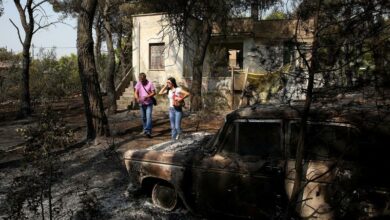Many Ian-affected Cubans still don’t have electricity

San Juan y Martinez, Cuba, Nov 13 (EFE).- Thirty-three-year-old Myldrey still doesn’t have electricity in her house 40 days after Hurricane Ian blasted the western Cuban province of Pinar del Rio with winds above 200 kilometers (124 miles) per hour.
She and a friend complained to EFE about the situation outside the town of San Juan y Martinez, where – along with the neighboring community of San Luis – just 75 percent of the population has recovered their electricity service, according to official figures.
“We buy food each day, because if you don’t (do that) you have to discard it after two or three days. We have to go to Pinar del Rio (about 22 km or 13.5 mi.) and get it ‘under the table’ at the foreign currency store because in the state stores there’s nothing,” said Myldrey’s 44-year-old friend.
Many Cubans buy scarce goods “under the table” at informal markets because they are almost impossible to acquire via the legal routes.
And what do they do with the food they get when they have no electricity to cook with? “We buy oil or coal” and “we … (cook) with wood,” they said while workers with the state-run electricity firm Union Electrica were trying to replace a power pole that had been downed a short distance away.
Ian knocked out the electricity grid across a large portion of Cuba and since then power has been restored only bit by bit. Currently, Cubadebate claimed last Thursday that 96 percent of the electric capacity had been restored.
The problems with the post-hurricane recovery in the province – above all in the two abovementioned towns – don’t end with electricity, however.
The government has acknowledged that it will be difficult in the short term to provide all the materials needed for rebuilding and repairing the more than 108,000 homes that were partially damaged or totally destroyed by the storm. So far, just 7,000 have been rebuilt or repaired, according to the state-run press.
The situation was criticized by the head of the Cuban Parliament, Esteban Lazo, during a visit he made to the region last weekend, when he said that “More than a month after the hurricane, we’re still discussing the same problems that we were dealing with on the very first day.”
Due to the lack of reconstruction materials, people like Jose Ariel are making do however they can. The 25-year-old fisherman living in San Juan y Martinez replaced his roof with zinc panels he and his neighbors collected.
Jose Ariel used a hammer to fasten wooden panels over the door of his home. He told EFE that just the day before, for the first time, he was visited by a government reconstruction brigade.
“We said that we needed cement but (they answered that) there wasn’t any. They told us: ‘You’ve already got a roof, you’re getting by’ and they don’t give you anything,” he said.
In his case, electricity was restored “about two weeks ago,” but he didn’t hide the fact that he felt helpless during the month after Ian, when he also didn’t have any water, saying “We paid about 2,500 pesos ($104 at the official exchange rate) for a few barrels that arrived here.”
A total of 164 of the 176 water supply sources in Pinar del Rio are working again, according to the official daily Granma.
The criticism of the government by Jose Ariel was echoed by Caridad Martinez, 79, who sells honey at the door of his home in San Juan y Martinez.
“I need cement to fasten the panels on my roof. My bed is soaked but they told me they didn’t need to give me anything,” he told EFE indicating his bedroom.
The lack of construction and repair supplies has been taken advantage of by people reselling these materials on the island, offering them at exorbitant prices on their Facebook pages or via WhatsApp and Telegram.
The practice is widespread all across the communist island and it’s becoming more and more common to see products being resold that you just can’t find on store shelves. And that situation has steadily been getting worse since the start of the coronavirus pandemic.
“They’re shameless. Look, it’s already difficult to get things but this is taking advantage of the people’s needs,” Martinez said.
In recent days, Cuban President Miguel Diaz-Canel admitted that this kind of activity is occurring “under the gaze of the core of the (Communist) Party, of the administrative institutions and of the directive councils.”





